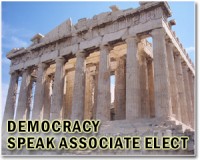| . |  |
. |
Cairo (UPI) May 5, 2011 Egypt's military-backed interim government is seeking to restore the country's former geopolitical clout as a regional powerbroker it lost under ousted President Hosni Mubarak's pro-Western strategy. Cairo's moves toward a new strategic realignment under the Supreme Council of the Armed Forces is worrying Israel and the United States, particularly with Egypt's inclination toward restoring ties with Iran and supporting the Palestinians' drive for statehood. "The new military rulers wish to see their country regain its status as the pre-eminent player in the Arab world," observed the U.S. think tank Stratfor. "From their perspective, this can be achieved by engaging in radical moves vis-a-vis the Palestinians, Israel and Iran." However, the general consensus among analysts and observers is that the Egyptians, particularly with the military in charge, is unlikely to force a breach with Israel by abrogating the historic peace treaty of 1979. If nothing else, Egypt's defense sector relies heavily on the $1.3 billion in military aid it gets from Washington annually, plus access to U.S. technology. Ditching the Camp David treaty brokered by U.S. President Jimmy Carter would also trigger a sharp, and potentially dangerous, increase in tension with Israel on Egypt's eastern flank which has been peaceful for 32 years. "It is hard to envision a military government in Egypt openly opting for such a scenario," Stratfor commented. "Easier to imagine is for SCAF-controlled Egypt beginning to behave like Turkey -- maintaining relations with Israel yet retaining the ability to challenge and criticize it." Egypt's intensive mediation that resulted in Wednesday's high-profile Palestinian reconciliation in Cairo between the mainstream "moderates" of Fatah, which controls the West Bank, and the militant fundamentalists of Hamas, who have ruled the Gaza Strip since June 2007, marked the Egyptians' new worldview. This was underlined by the fact that the Hamas leaders were received with diplomatic pomp at the Egyptian Foreign Ministry rather than the "safe houses" run by Egyptian intelligence that were the venues for talks during the Mubarak era, when Hamas was kept at arms' length or shunned altogether. Cairo's warming to Shiite Iran and Sunni Hamas "represents a tectonic shift that is undeniably secular," observed veteran analyst M.K. Bhadrakumar, a former Indian ambassador to the Soviet Union, Afghanistan, Kuwait and Turkey. "It traverses the great sectarian schism in the world of Islam and it is leagues away from the archaic geopolitics build around 'isolating' Iran in the region that Saudi Arabia and the United States were hoping to perpetuate." Egyptian efforts to reclaim the ancient land's historic influence in the region, amid the potentially profound changes shaking up the long-stagnant Arab world, shakes up the Middle Eastern order and may well signal a new era in the turbulent region. Egypt's announcement it will open the long-closed Rafah crossing into Gaza in the coming days appalled Israel, which has blockaded the coastal strip since 2007 and had relied on Mubarak's regime to complete the circle. Egyptian Foreign Minister Nabil al-Araby branded the closure of the crossing "a disgusting matter" because Arab was harming Arab. These moves concerning Iran and Hamas, both vilified by the Americans, reflect the antipathy that the vast majority of Egyptians feel toward Israel and to the United States. A recent poll indicated 54 percent of Egyptians asked said they favored scrapping the 1979 peace treaty with Israel. All this has Israelis deeply worried. If relations with Egypt, its western neighbor, nosedive then, Israelis fear, so will links with Jordan to the east, with which they signed a peace pact in 1994. There too, antipathy toward the Jewish state is deep-rooted. More than half -- possibly as much as 70 percent -- of the Hashemite kingdom's people are Palestinian. But it is the prospect of relations between Iran, reviled and feared in a bizarre symbiosis by most Arab states and Israel, and Egypt being restored after 32 years that sets teeth grinding in Israel and the United States. No one's predicting a Tehran-Cairo strategic alliance will emerge but they see only grief coming from Cairo's efforts to engage Iran. "In terms of Iran's efforts to flex its muscles in the region, having an embassy in Cairo, plus sending warships through the Suez Canal, will help its ambitions to project its power in the region," warned Meir Javedanfar, an Iranian-born commentator based in Israel.
Share This Article With Planet Earth
Related Links Democracy in the 21st century at TerraDaily.com
 Syria's Daraa a 'town of fear' after army crackdown
Syria's Daraa a 'town of fear' after army crackdownDaraa, Syria (AFP) May 5, 2011 An ominous silence prevailed in the hitherto restive Syrian town of Daraa, where the army withdrew from Thursday after a 10-day crackdown on anti-regime protesters. In its wake, residents stepped out of their houses for the first time, most of them mute with fear. Further testimony to the intensity of the military incursion litters the streets. Spent bullet casings, broken glass, tan ... read more |
|
| The content herein, unless otherwise known to be public domain, are Copyright 1995-2010 - SpaceDaily. AFP and UPI Wire Stories are copyright Agence France-Presse and United Press International. ESA Portal Reports are copyright European Space Agency. All NASA sourced material is public domain. Additional copyrights may apply in whole or part to other bona fide parties. Advertising does not imply endorsement,agreement or approval of any opinions, statements or information provided by SpaceDaily on any Web page published or hosted by SpaceDaily. Privacy Statement |